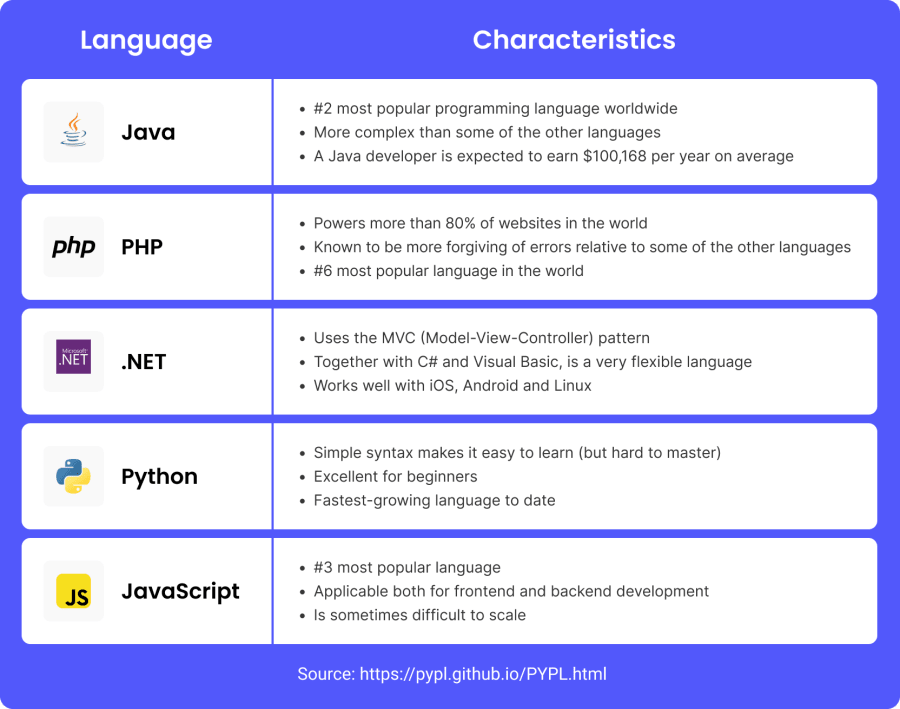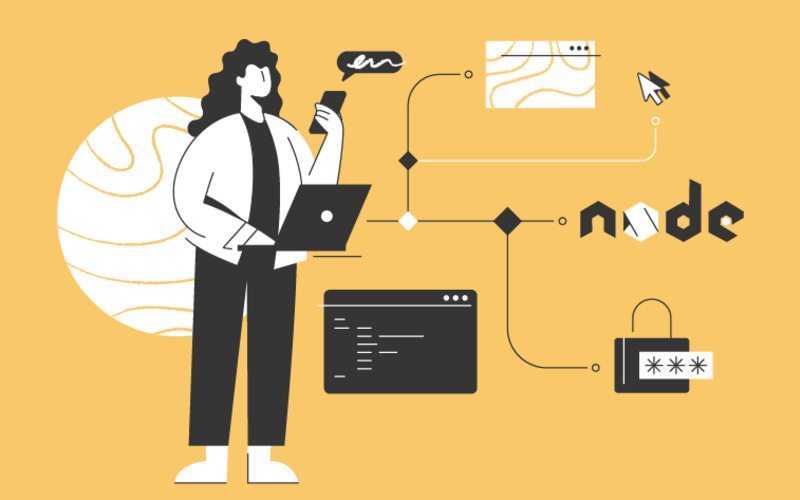NEW
Proxify is bringing transparency to tech team performance based on research conducted at Stanford. An industry first, built for engineering leaders.
Learn more
There is an eons-long battle between frontend and backend developers: which one is the more important skill? Further, why should anyone care about bickering when, instead, we can use whatever precious time we’ve left to debug code?
A possible answer to this question would simply be: fullstack. Fullstack engineers can solve anything between backend and frontend development, and more.
However, fullstack professionals are more expensive and harder to find. So, for now, let’s stick with the notion of backend application development and try to solve it as such.
Meaning, I would try to answer the following inquiries:
- Where to find quality backend developers;
- How to test their skills;
- How to pick between multiple quality candidates;
- How to manage them in the most efficient way possible.
Let’s begin.
What is backend development?
Backend software development, which encompasses everything from desktop and web to cloud and database management, is the main skill that powers the entire web. It does this so seamlessly that most users aren’t really aware of the backend development process – which is exactly what an IT project leader would like to hear.
If things break on the backend, users will quickly become aware that something has gone awry. Or, in an idiosyncratic twist of fate: as long as the average user isn’t aware of the intricacies that happen behind the scenes (on a website), the better the user experience will be.
A backend developer (also known as a backend engineer) is mainly responsible for building the foundation of a website and ensuring that the website works. They come up with the code, they build the structure and they make sure the application logic works as intended.
Most visitors aren’t even aware of the technology that powers the application; it’s never witnessed directly by the end-users.
Backend technologies include servers, applications, databases, programming languages, frameworks, and more.
How popular is backend software development?
Backend development is not only popular – it’s absolutely necessary for the functioning of the web. Without backend development, there would be no frontend software development teams, no frontend developers and simply no web.
Still, some backend programming languages enjoy more popularity compared to other languages.
Here’s how things stand at the moment:

Where to find backend software developers
Backend developers are not hard to find. However, finding quality backend developers is a different story altogether.
In order to hire the right backend developers (including project managers, web developers, software engineers and coders) you need either a screening tool or a platform that pre-screens and extensively tests their applicants, to begin with.
Depending on your budget, dedication, and nerves, either one of these options is a viable one. However, the first one requires more time, while the second option is more budget-reliant compared to the first one.
You can find high-quality backend developers by visiting any of the following platforms:
- Upwork
- Toptal
- Fiverr
- Turing
- Stepstone
- Proxify (that’s us!)
We offer elite backend developers proficient in the most popular stacks today, including PHP, JavaScript, Java, .NET, Ruby, Ruby on Rails and more.
Our packages include both part-time and full-time opportunities, and we are up to 50% more cost-effective than some of the other freelance job boards on the market.
How to interview backend software developers
Interviewing applicants with backend software development proficiency requires candidate assessment for two types of skills:
- Soft skills (communication, English proficiency, openness, creativity, assertiveness)
- Hard skills (coding, debugging, problem-solving abilities, technical knowledge, ability to learn and apply new trends and paradigms as needed)
Top 5 technical skills every backend developer should have
To become a multi-faceted backend developer, working on multiple projects and solving problems as they arise, a candidate will need to master several programming languages.
These include:
Java: It’s written in an IDE (Integrated Development Environment) before being compiled in a low-level language that can be understood by software interpreters. Java is a very valuable skill to have for any promising backend developer, mostly because of its high-performance, robust quality (in terms of solving programming challenges) and proven adaptability.
PHP: It’s the most commonly used server-side scripting language for website development worldwide. Currently, there are more than 20M websites that use PHP and that number continues to grow (although at a slower pace). So far, more than 77% of websites worldwide use PHP, and these are websites for which we know the server-side language, with a percentage number steadily increasing. Plus, PHP also allows MySQL integration and support, which solves two challenges in a “single swoop”.
Python: While having little to do with the eponymous snake after which it was named, Python is one of the main languages for backend development today. In fact, a 2022 StackOverflow study found that Python was one of the most used languages, with 48.07% of professional developers choosing it for their work. Python employs functional, procedural and object-oriented programming concepts with ease. It’s also relatively easy to learn, which makes it the ideal choice both for beginners and seasoned backend programmers likewise.
SQL: The so-called “Structured Query Language”, or SQL, seems to persist across the span of multiple decades against all odds. It allows programmers to easily enter, remove, and manipulate database entries, as well as create new tables and even assign permissions for those same tables. At some point in time, a professional backend software developer will have to deal with databases. For that, SQL is a skill they absolutely must know.
Git: Adding new features to an application willy-nilly is not going to take anyone anywhere. To do it right, developers need to have a robust version control system that will track changes and document code commits accordingly. For that, there’s Git. Git is an open-source version control system that handles all kinds of projects, regardless of scale and size. Needless to say, a seasoned backend developer would have to know Git by heart.
Meanwhile, I had some questions regarding backend development and was keen to find out how our extensive network of Proxify developers would tackle them.
My questions were:
- What are some of the key differences between backend and frontend development?
- What are your favorite (fastest, most optimized, most popular) languages, frameworks, and tools for backend development?
- What is the future of backend software development?
Bahaa Mashtoub was up to the challenge. Regarding the first question, here’s what he had to say:
“Backend and frontend development are parts of the software application development process. The objectives of frontend development are different from the backend objectives and thus programming languages/frameworks have been designed for each of them. When it comes to frontend, there are several areas to work on but mostly revolves around UI/UX, meaning the User Interface & the User Experience.”
In continuation, Bahaa elaborated even further.
“Having said that, frontend development is about developing code that takes effect in the client's Browser/App and that the user interacts with”, he said.
Concerning the challenges between frontend and backend development, Bahaa delineated several crucial differences between the two.
“In addition to Microsoft technologies, several frameworks have been developed and designed to simplify and secure this client-side/frontend development, such as Angular, React, Vue and others”, he noted. On top of that, Bahaa also said that working with frontend has its unique challenges, such as designing a responsive User Interface, where design remains consistent if the screen resolutions change.
“Another challenge”, he added, “is security, as storing data in the frontend relies on cookies and local/session storage.”
“Whereas, when it comes to backend, the main focus is to develop multi-layer, independent/scalable, secure and fast services that work on the server. These backend services can communicate with each other and with existing databases to perform operations and handle requests from the frontend and provide responses back.”
“So”, Bahaa’s first answer was drawing to a close, “the main functionality is to create a strong and secure backend that can handle requests from the users and perform operations as needed.”
He noted that there are several challenges regarding the backend development process that include:
- Security
- Scalability
- Authentication
- Authorization
- Performance
- And others
“One of the most common problems faced by many companies is what I like to call the Monolithic Way of development of backend code. In the recent way of development, a microservices architecture has been introduced that helps build scalable and secure applications”, Bahaa concluded the first question.
What about Bahaa’s favorite tools for backend development? He listed a few:
- C# (language)
- Microsoft Asp.net framework
- ASP.NET Core
- Entity Frameworks
- Linq
- Postman
- Visual Studio 2022
- Rider
- Web Apis
- Ocelot
- Microservices
- Unit tests
Finally, I wanted to get a more general overview of the future of backend software development. How’s it look from the perspective of a seasoned developer?
“I actually think that the future will keep providing more and more tools to have a faster, more scalable, reusable and customizable backend development that helps perform operations in an easier way. For many companies, I think their future is microservices architecture, especially if they want to scale their application globally.”
Top broad concepts backend developers should be familiar with
Being a top-notch technical whiz is most certainly a desirable trait, but hiring solely on that trait is a recipe for disaster.
Besides technical proficiency, a quality backend developer should also be excellent at communicating their ideas to their team leader, coworkers, as well as the upper echelon of the company (CEO, COO).
Having well-established communication skills makes it easier to collaborate with everyone across the company, including coworkers who aren’t proficient in programming languages and who don’t know the intricacies of software development.
Other soft skills that every developer should take into consideration are:
Proactiveness: When applicable, solving problems on their own instead of waiting for someone else to make an executive decision.
Assertiveness: Actively participating in the development of the project, instead of passively following tasks and orders.
Being a team player: Having the patience to explain complex concepts in simple terms to people who aren’t necessarily familiar with code.
Punctuality: Working with limited resources and getting things done on time is a MUST.
Creativity: Everyone needs to approach the problem from a bird’s-eye perspective once in a while; in other words, changing the vantage point will often lead to more optimized solutions to any given task.
Backend development interview questions
Here are some backend developer questions to kick-start the conversation during the interview process:
1. What is your favorite programming language?
- Expected answer: Java, JavaScript, PHP, .NET
2. How do you approach debugging?
- Expected answer: I approach debugging using the scientific method. First, I form a hypothesis. Then, I create an experiment to disprove it. Finally, I repeat the steps until the bug is found and patched up.
3. What is “high cohesion”?
- Expected answer: “High cohesion” is a concept in programming where you create a class that has a well-defined job. On the other hand, “low cohesion” refers to a class that does many jobs that have little in common.
4. What is “coupling”?
- Expected answer: Coupling measures the degree to which different software modules are interdependent of each other. A good application will have low coupling.
5. What is a NoSQL database?
- Expected answer: NoSQL databases are different from SQL databases in that they store (and retrieve) entries in documents rather than relational tables. Besides using documents, NoSQL databases can also store information in key-values, wide-columns, and graphs.
Why should you hire backend developers?
Backend development is absolutely necessary for the success of an application. Trying to build an app without backend developers is like trying to knit a sweater without using needles!
Take a look at some of our choices and feel free to book a short call to further discuss your needs.
The perfect fit awaits!






















